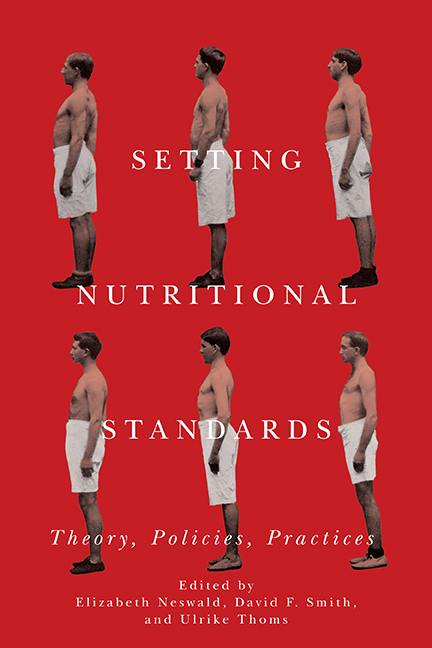Book contents
- Frontmatter
- Contents
- Acknowledgments
- Introduction
- 1 Nutritional Knowledge between the Lab and the Field: The Search for Dietary Norms in the Late Nineteenth and Early Twentieth Centuries
- 2 How Vegetarians, Naturopaths, Scientists, and Physicians Unmade the Protein Standard in Modern Germany
- 3 Of Carnivores and Conquerors: French Nutritional Debates in the Age of Empire, 1890–1914
- 4 Setting Standards: The Soldier's Food in Germany, 1850–1960
- 5 The Quest for a Nutritional El Dorado: Efforts to Demonstrate Dietary Impacts on Resistance to Infectious Disease in the 1920s and 1930s
- 6 “Not a Complete Food for Man”: The Controversy about White versus Wholemeal Bread in Interwar Britain
- 7 “Proscribing Deception”: The Gould Net Weight Amendment and the Origins of Mandatory Nutrition Labeling
- 8 When Is a Famine Not a Famine? Gauging Indian Hunger in Imperial and Cold War Contexts
- Selected Bibliography
- List of Contributors
- Index
1 - Nutritional Knowledge between the Lab and the Field: The Search for Dietary Norms in the Late Nineteenth and Early Twentieth Centuries
Published online by Cambridge University Press: 18 April 2018
- Frontmatter
- Contents
- Acknowledgments
- Introduction
- 1 Nutritional Knowledge between the Lab and the Field: The Search for Dietary Norms in the Late Nineteenth and Early Twentieth Centuries
- 2 How Vegetarians, Naturopaths, Scientists, and Physicians Unmade the Protein Standard in Modern Germany
- 3 Of Carnivores and Conquerors: French Nutritional Debates in the Age of Empire, 1890–1914
- 4 Setting Standards: The Soldier's Food in Germany, 1850–1960
- 5 The Quest for a Nutritional El Dorado: Efforts to Demonstrate Dietary Impacts on Resistance to Infectious Disease in the 1920s and 1930s
- 6 “Not a Complete Food for Man”: The Controversy about White versus Wholemeal Bread in Interwar Britain
- 7 “Proscribing Deception”: The Gould Net Weight Amendment and the Origins of Mandatory Nutrition Labeling
- 8 When Is a Famine Not a Famine? Gauging Indian Hunger in Imperial and Cold War Contexts
- Selected Bibliography
- List of Contributors
- Index
Summary
Introduction
Late nineteenth-century nutrition science occupied an ambiguous space. It emerged in the same decades as the development of quantitative, precision, and apparatus-based methods in physiology and the spread of statistical thinking, and it combined these two very different approaches in unique ways. Nutrition science connected theory with practice, studies of individuals with studies of populations, methods from the natural sciences with methods from the social sciences. It was an experimental science and an applied science. Its information sources were found in the lab, in the verbal accounts of experimental subjects, in markets, institutions, private homes, hospitals, shops, and workplaces. It aimed for the precision of physics and chemistry, but was confronted with the enormous variability of its subjects, objects, and external circumstances, and with discrepancies between the artificially controlled conditions of the lab and the variable conditions of human life.
The early history of nutrition science has been explored from a variety of perspectives. Most studies focus on Germany and the United States, the two countries that led in the development of its theories, methods, and applications in the later nineteenth and early twentieth centuries. Kenneth Carpenter, Frederic L. Holmes, and Nicolas Mani have described this history from a largely internal perspective, delineating the main fi gures and theoretical development of nutritional physiology. Studies that approach it from a social historical perspective have also not been lacking. In particular, Harvey Levenstein and Naomi Aronson have shown how research on nutrition in the United States was intimately connected to social concerns and, in Aronson's case, to questions of social control and biopolitics. Similar interactions between laboratory research and social context have been confi rmed in studies on a number of countries.
Studies focused primarily on physiological theory pay homage to the social context of their application, and social historical works frequently describe the theories on which nutrition policies and reform initiatives were based, but the impression can arise that the laboratory was the site for the production of nutritional knowledge, and the apparatus of the exact sciences—experiments, instruments, and precision techniques—the means of its generation. Although laboratory studies were crucial in the history of nutrition science, their methods and results were not uncontested.
Information
- Type
- Chapter
- Information
- Setting Nutritional StandardsTheory, Policies, Practices, pp. 29 - 51Publisher: Boydell & BrewerPrint publication year: 2017
